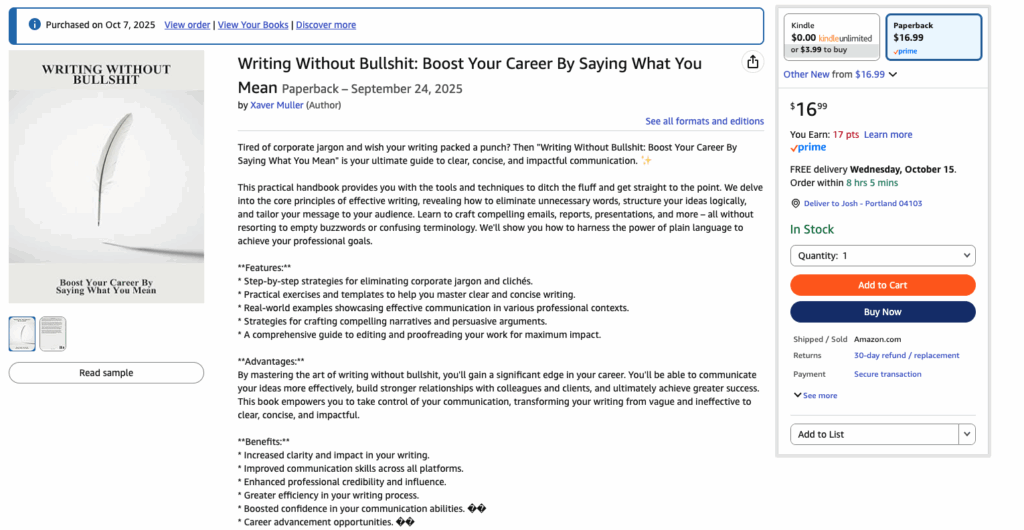Authors beware: Amazon hosts pirates.
A recent search on Amazon.com pulled up this version of my 2016 book Writing Without Bullshit.

It’s pirated, of course.
I bought a copy. It’s a poorly formatted paperbound 8 1/2 by 11 ripoff that appears to have most of the text of my book, including a copy of my index with the wrong page numbers. The author doesn’t exist. It’s self-published. Its existence offends me.
Amazon is a top AI company. Why isn’t it smarter?
To report this as pirated content, I had to:
- Buy a copy.
- Report it on Amazon’s infringement page.
- File a report that includes both my copyright registration (found in a search on copyright.gov here) and the order number of the counterfeit copy I bought.
- Agree to have my contact information shared with the pirate who put the page up.
None of this should be necessary. Like all the large tech companies, Amazon has a massive AI investment, including the AI behind its voice search engine Alexa. A simple AI could identify copies like this automatically.
Amazon knows that my book was published by a major publisher and it has access to the complete text via the ebook. The creation of a self-published book with substantially the same text should be easily detectable. Amazon should have blocked this before it ever went up on the site.
How hard would it be to create a rule that compares text of legitimately copyrighted books to “new” self-published editions and blocks the new editions?
Amazon’s page on protecting the rights of rights owners says “Amazon is dedicated to ensuring that goods do not violate or infringe a Rights Owner’s intellectual property (IP).” But as usual, Amazon’s focus is to do as little as possible without the need to interact with humans. But automating this would be trivial, and would serve not only the legitimate authors but the buyers who buy these products by mistake and get crap instead of the book they were looking for.
Enshittification indeed.
Have you thought of a class action against this? There are surely other authors suffering the same problem and putting all the problems together would at least present a stronger case?
Best of luck. I wonder if Amazon’s AI itself helped “create” this plagiarized content :-(.
Outrageous. Outrageous injustice for writers and buyers alike.
That’s terrible and outrageous!!!
I wouldn’t be surprised if Amazon rejects your claim because you lack standing. Someone at your publisher may be responsible for this type of thing. I found this out by attempting to submit a claim a while back for one of my Wiley books.
Yes, though, Amazon’s actions once again belie its words here. Absurd.